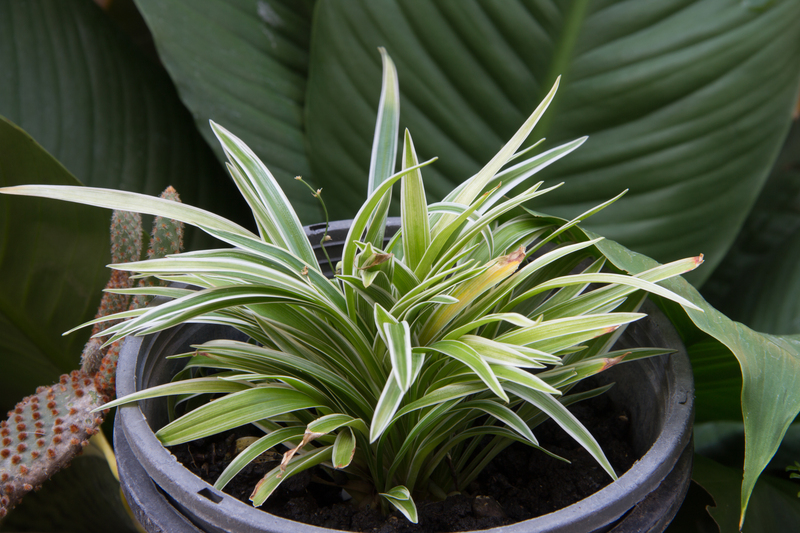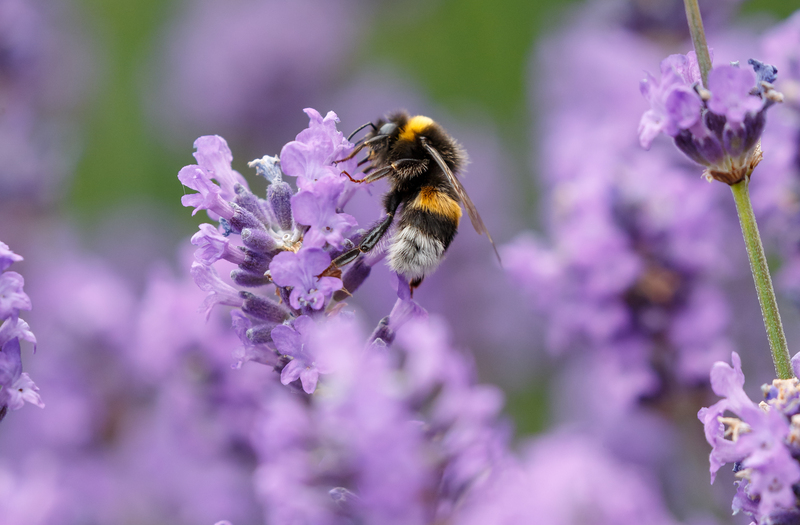Revitalizing Soil Through Organic Waste Utilization
Posted on 30/09/2025
Revitalizing Soil Through Organic Waste Utilization
Healthy soil is the bedrock of global food production and ecological balance. Over the years, modern agriculture and unsustainable land management have led to significant soil degradation, threatening food security and environmental sustainability. Fortunately, revitalizing soil through organic waste utilization provides a sustainable avenue to restore soil health, increase productivity, and promote environmental resilience.
Understanding the Importance of Soil Health
Soil is much more than just dirt; it is a thriving ecosystem supporting millions of microorganisms, plant life, and ultimately, human well-being. Degraded soils lead to:
- Reduced agricultural productivity
- Increased carbon emissions
- Poor water retention and increased flooding
- Loss of biodiversity
Ensuring soil fertility is crucial for feeding the world's growing population and ensuring environmental health.
Common Causes of Soil Degradation
- Excessive use of chemical fertilizers and pesticides
- Deforestation and land clearing
- Overgrazing by livestock
- Erosion by wind and water
- Unsustainable farming practices

The Role of Organic Waste in Soil Revitalization
Organic waste includes materials derived from living organisms, such as plant residues, food scraps, agricultural by-products, and manure. When managed correctly, organic waste utilization can transform waste into a valuable resource that rejuvenates the soil. Rather than being sent to landfills, these organic materials can be recycled back into the land, closing the nutrient loop and fostering sustainability.
How Organic Matter Benefits Soil Health
Incorporating organic waste into soil management practices yields numerous benefits:
- Enhances nutrient content: Organic matter supplies essential nutrients like nitrogen, phosphorus, and potassium.
- Improves soil structure: Increased organic matter improves soil aeration, porosity, and root penetration.
- Promotes water retention: Soils rich in organic content retain moisture more efficiently, reducing drought stress.
- Supports beneficial microbes: Organic matter fuels microbial activity, essential for nutrient cycling.
- Reduces dependency on chemical fertilizers: Utilizing waste-derived compost and manure lessens the need for synthetic inputs, minimizing environmental pollution.
Types of Organic Waste Suitable for Soil Enhancement
Not all organic waste is equal in its potential to regenerate soil. The following are effective sources for soil revitalization:
- Compost: Decomposed organic material from garden waste, kitchen scraps, and yard trimmings.
- Animal Manure: Nutrient-rich waste produced by livestock, poultry, and other animals.
- Green Manure: Cover crops like clover or vetch, grown and then incorporated into the soil.
- Crop Residues: Leaves, stems, and roots left after harvest (corn stalks, rice straw, etc.).
- Agro-industrial Waste: By-products from food processing industries (coffee husks, sugarcane bagasse, fruit pulp).
What About Urban Organic Waste?
Cities generate massive quantities of organic waste daily. Through proper segregation and composting, urban organic waste can be converted into high-value compost and soil amendments, contributing to greener cities and healthier peri-urban soils.
Composting: The Foundation of Organic Waste Utilization
Composting is the controlled aerobic decomposition of organic materials, transforming waste into nutrient-rich humus that enhances soil health. This process can be small-scale (backyard composting) or large-scale (industrial composting facilities).
Steps to Producing High-Quality Compost
-
Collecting Materials: Gather a mix of green (nitrogen-rich) and brown (carbon-rich) waste.
- Green waste: Vegetable scraps, coffee grounds, grass clippings
- Brown waste: Dry leaves, branches, straw, cardboard
- Building the Pile: Alternate layers of green and brown materials for balance.
- Moisture and Aeration: Maintain adequate moisture (like a wrung-out sponge) and turn regularly for aeration.
- Monitoring: Check temperature, moisture, and decomposition progress regularly.
- Curing and Application: Allow compost to mature before applying to the soil for maximum benefit.
Vermicomposting: Harnessing the Power of Earthworms
Vermicomposting is another organic waste recycling technique that utilizes earthworms to convert biodegradable matter into rich, dark worm castings. These castings contain highly concentrated nutrients and beneficial microbes, making them an excellent soil amendment. Vermicomposting is well-suited for kitchen scraps, garden residues, and paper waste, making it ideal for both rural and urban settings.
Biochar: Enhancing Soil with Pyrolyzed Organic Waste
Biochar is a carbon-rich product produced by heating organic waste (wood chips, crop residues) in a low-oxygen environment. Adding biochar to soil improves its fertility, water retention, and carbon sequestration ability, contributing to both soil health and climate change mitigation.
Benefits of Biochar-Enriched Soils
- Increased microbial activity
- Improved nutrient retention and slow-release
- Long-lasting stability in the soil
- Reduction in greenhouse gas emissions from soils
Organic Waste Utilization Best Practices for Different Scales
Household and Community Level
- Set up backyard compost bins or vermicomposting units.
- Encourage household waste segregation for effective recycling and composting.
- Use compost for gardens, lawns, and landscape improvement.
- Engage in community-based composting initiatives for collective impact.
Commercial Farms and Agriculture
- Incorporate crop residues and manure back into fields as amendments.
- Utilize green manure and cover cropping to replenish soil organic matter.
- Invest in large-scale composting or biogas plants for managing voluminous organic waste.
- Regularly test soil to optimize organic amendments and monitor improvements.
Urban and Municipal Initiatives
- Establish municipal organic waste collection and composting systems.
- Promote use of finished compost in urban landscaping, green roofs, and peri-urban agriculture.
- Awareness campaigns to educate citizens about organic waste sorting and its role in urban sustainability.
The Environmental Significance of Soil Revitalization via Organic Waste
Utilizing organic waste for soil revitalization extends benefits far beyond the farm or backyard:
- Landfill Diversion: Reduces methane emissions from landfills, a potent greenhouse gas.
- Carbon Sequestration: Enhanced soil organic matter stores atmospheric carbon, mitigating climate change.
- Pollution Prevention: Decreases reliance on chemical inputs that contaminate water and soil.
- Biodiversity Support: Healthy soils foster diverse microbial, fungal, and plant communities.
- Improved Water Quality: Reduces nutrient runoff, protecting rivers and lakes from pollution.
Challenges and Solutions in Organic Waste-Based Soil Revitalization
Overcoming Barriers to Adoption
- Collection and Segregation: Effective organic waste recycling relies on source separation. Education and incentives can foster proper segregation at the household and municipal levels.
- Odor and Pest Issues: Proper management of moisture and aeration, along with using sealed bins, can minimize unpleasant odors and pests.
- Contamination: Avoid adding plastics, metals, and chemicals to compost to prevent soil contamination.
- Limited Awareness and Training: Extension services, digital platforms, and demonstration projects can increase awareness, knowledge, and skills.
Policy and Economic Incentives
- Government support in the form of grants, subsidies, and technical assistance.
- Building markets for compost and organically enriched soils supports a circular economy.
- Incentivizing businesses and communities to participate in organic waste recycling.
International Success Stories of Organic Waste for Soil Regeneration
Countries globally have embraced organic waste utilization for soil regeneration with impressive results:
- India: Major cities implemented decentralized composting, turning food and market waste into valuable soil amendments for urban agriculture.
- Ethiopia: Smallholder farmers use crop residues and manure for composting, leading to improved crop yields and restored soil fertility.
- Germany: The country boasts a robust bio-waste recycling system, with extensive use of municipal organic waste for composting and biogas production.
- United States: Large-scale composting projects in California and other states reduce landfill burden while enhancing agricultural soils.

Future Trends in Soil Revitalization Using Organic Waste
Emerging research and innovations are making organic waste utilization for soil health even more effective:
- Digital Platforms: Platforms for connecting waste generators with composters, facilitating efficient resource use.
- Advanced Composting Technologies: In-vessel, aerobic digesters for faster and odor-free composting.
- Microbial and Fungal Inoculants: Adding specialized microbes to compost for targeted soil health improvements.
- Soil Sensors and Monitoring: Real-time data to optimize amendment applications for maximum impact.
Conclusion: A Path Forward for Sustainable Soil Management
Revitalizing soil through organic waste utilization represents a win-win solution for agriculture, the environment, and society. By transforming kitchen scraps, farm residues, and urban waste into valuable fertilizers, we can restore the vital functions of our soil, reduce pollution, and move toward a truly sustainable, circular economy. Whether at home, on the farm, or at the city level, embracing organic waste-based soil management is essential for a healthier planet and a secure food future.
Let us act now to nurture the ground beneath our feet--because healthy soil means healthy life for all.



